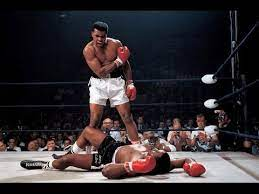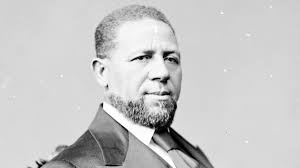Young Muhammad Ali knocks out Sonny Liston for first world title
On February 25, 1964, 22-year-old Cassius Clay shocks the odds-makers by dethroning world heavyweight boxing champ Sonny Liston in a seventh-round technical knockout. The dreaded Liston, who had twice demolished former champ Floyd Patterson in one round, was an 8-to-1 favorite. However, Clay predicted victory, boasting that he would “float like a butterfly, sting like a bee” and knock out Liston in the eighth round.
The fleet-footed and loquacious youngster who would later become known as Muhammed Ali needed less time to make good on his claim—Liston, complaining of an injured shoulder, failed to answer the seventh-round bell. A few moments later, a new heavyweight champion was proclaimed.
Cassius Marcellus Clay Jr. was born in Louisville, Kentucky, in 1942. He started boxing when he was 12 and by age 18 had amassed a record of over 100 wins in amateur competition. In 1959, he won the International Golden Gloves heavyweight title and in 1960 a gold medal in the light heavyweight category at the Summer Olympic Games in Rome. Clay turned professional after the Olympics and went undefeated in his first 19 bouts, earning him the right to challenge Sonny Liston, who had defeated Floyd Patterson in 1962 to win the heavyweight title.
On February 25, 1964, a crowd of 8,300 spectators gathered at the Convention Hall arena in Miami Beach to see if Cassius Clay, who was nicknamed the “Louisville Lip,” could put his money where his mouth was. The underdog proved no bragging fraud, and he danced and backpedaled away from Liston’s powerful swings while delivering quick and punishing jabs to Liston’s head. Liston hurt his shoulder in the first round, injuring some muscles as he swung for and missed his elusive target. By the time he decided to discontinue the bout between the sixth and seventh rounds, he and Clay were about equal in points. A few conjectured that Liston faked the injury and threw the fight, but there was no real evidence, such as a significant change in bidding odds just before the bout, to support this claim.
To celebrate winning the world heavyweight title, Clay went to a private party at a Miami hotel that was attended by his friend Malcolm X, an outspoken leader of the African American Muslim group known as the Nation of Islam. Two days later, a markedly more restrained Clay announced he was joining the Nation of Islam and defended the organization’s concept of racial segregation while speaking of the importance of the Muslim religion in his life. Later that year, Clay, who was the descendant of a formerly enslaved person, rejected the name originally given to his family by the owner of enslaved peoples and took the Muslim name of Muhammad Ali.
Muhammad Ali would go on to become one of the 20th century’s greatest sporting figures, as much for his social and political influence as his prowess in his chosen sport. After successfully defending his title nine times, it was stripped from him in 1967 after he refused induction into the U.S. Army on the grounds that he was a Muslim minister and therefore a conscientious objector. That year, he was sentenced to five years in prison for violating the Selective Service Act but was allowed to remain free as he appealed the decision. His popularity plummeted, but many across the world applauded his bold stand against the Vietnam War.
In 1970, he was allowed to return to the boxing ring, and the next year the U.S. Supreme Court overturned Ali’s draft evasion conviction. In 1974, he regained the heavyweight title in a match against George Foreman in Zaire and successfully defended it in a brutal 15-round contest against Joe Frazier in the Philippines in the following year. In 1978, he lost the title to Leon Spinks but later that year defeated Spinks in a rematch, making him the first boxer to win the heavyweight title three times. He retired in 1979 but returned to the ring twice in the early 1980s. In 1984, Ali was diagnosed with pugilistic Parkinson’s syndrome and has suffered a slow decline of his motor functions ever since. He was inducted into the International Boxing Hall of Fame in 1990. In 1996, he lit the Olympic flame at the opening ceremonies of the Summer Games in Atlanta, Georgia. Ali’s daughter, Laila, made her boxing debut in 1999.
At a White House ceremony in November 2005, Ali was awarded the Presidential Medal of Freedom. On June 3, 2016, Ali passed away after a period of failing health.
SPORTS
1940
NHL game televised in US for first time
On February 25, 1940, the first telecast of a National Hockey League is transmitted over New York's W2XBS—the National Broadcasting Company's experimental station used to test TV technology. A viewing audience estimated at 300 subscribers watches the New York Rangers defeat the Montreal Canadiens, 6-2, at Madison Square Garden.
SPORTS
1987
NCAA suspends SMU football program for 1987 season
On February 25, 1987, the NCAA suspends the Southern Methodist University football program for 1987 season for repeated rules violations but stops short of imposing the so-called "death penalty." Still, the sanctions are the most severe levied by the NCAA against a major college football program.
CIVIL WAR
1862
Legal Tender Act passed to help finance the Civil War
On February 25, 1862, the U.S. Congress passes the Legal Tender Act, authorizing the use of paper notes to pay the government’s bills. This ended the long-standing policy of using only gold or silver in transactions, and it allowed the government to finance the enormously costly Civil War long after its gold and silver reserves were depleted.
BLACK HISTORY
1870
First African American congressman sworn in
Hiram Rhodes Revels, a Republican from Natchez, Mississippi, is sworn into the U.S. Senate, becoming the first African American ever to sit in Congress. During the Civil War, Revels, a college-educated minister, helped form African American army regiments for the Union cause, Posted to Mississippi, Revels remained in the former Confederate state after the war and entered into Reconstruction-era Southern politics.
U.S. PRESIDENTS
1828
John Quincy Adams’ son marries relative at the White House
On February 25, 1828, John Adams, son of President John Quincy Adams, marries his first cousin and inadvertently follows a pattern of keeping marriages within the family. John Adams’ grandfather, President John Adams, had married his third cousin, Abigail Smith.
ART, LITERATURE, AND FILM HISTORY
1956
Sylvia Plath and Ted Hughes meet
On February 25, 1956, Sylvia Plath meets her future husband, Ted Hughes, at a party in Cambridge, UK. The two poets fell in love at first sight and married four months later. Plath was born in 1932, the daughter of an autocratic German father who taught biology and was a leading expert on bumblebees. Plath’s father died at home after a lingering illness that consumed the energy of the entire household and left the family penniless. Sylvia’s mother went to work as a teacher and raised her two children alone.
ART, LITERATURE, AND FILM HISTORY
2004
"The Passion of the Christ" opens in the United States
The Passion of the Christ, Mel Gibson’s controversial film about the last 44 hours of Jesus of Nazareth’s life, opens in theaters across the United States on February 25, 2004. Not coincidentally, the day was Ash Wednesday, the start of the Catholic season of Lent.
CRIME
1949
Actor Robert Mitchum is released after serving time for marijuana possession
Actor Robert Mitchum is released from a Los Angeles County prison farm after spending the final week of his two-month sentence for marijuana possession there. In the fall of 1948, Mitchum, the star of classics such as Cape Fear and Night of the Hunter, was smoking a joint at a small party in the Laurel Canyon area of Los Angeles when detectives burst in and arrested him. Mitchum reportedly said at the time, “Well, this is the bitter end of everything—my career,my marriage, everything.” In fact, it wasn’t really that bad. Mitchum was separated from his wife Dorothy at the time, but the two reconciled when she returned to support him through the scandal. And the public didn’t mind much either; Rachel and the Stranger, the first movie released after his troubles, was a box-office hit.
COLD WAR
1948
Communists take power in Czechoslovakia
Under pressure from the Czechoslovakian Communist Party, President Edvard Benes allows a communist-dominated government to be organized. Although the Soviet Union did not physically intervene (as it would in 1968), Western observers decried the virtually bloodless communist coup as an example of Soviet expansion into Eastern Europe.
AMERICAN REVOLUTION
1779
British surrender Fort Sackville
On February 25, 1779, Fort Sackville is surrendered, marking the beginning of the end of British domination in America’s western frontier. Eighteen days earlier, George Rogers Clark departed Kaskaskia on the Mississippi River with a force of approximately 170 men, including Kentucky militia and French volunteers. The party traveled over 200 miles of land covered by deep and icy flood water until they reached Fort Sackville at Vincennes (Indiana) on February 23, 1779. After brutally killing five captive British-allied Native Americans within view of the fort, Clark secured the surrender of the British garrison under Lieutenant-Governor Henry Hamilton at 10 a.m. on February 25.











Comments
Post a Comment